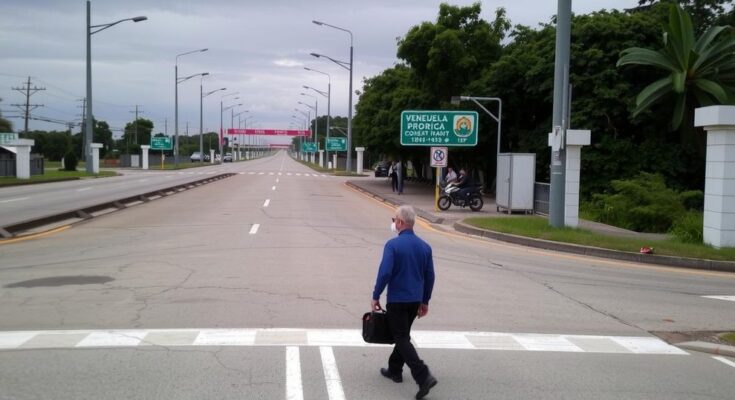President Nicolas Maduro of Venezuela is set to be sworn in for a third term amidst protests and international condemnation, notably from opposition leader Maria Corina Machado. The Colombian border has been closed as tensions rise, while international leaders express concerns over repression and support for Venezuelan dissidents. Maduro’s government continues to face accusations of fraud and human rights violations, maintaining power amid significant external and internal challenges.
Venezuela’s President Nicolas Maduro is set to take the oath of office for a third term this Friday amidst widespread protests and international condemnation. The previous evening, opposition leader Maria Corina Machado led a demonstration in Caracas, although she was briefly detained after the rally, an action that drew severe criticism of the Maduro government’s tactics against dissent. This back-and-forth has ignited concerns regarding the atmosphere of oppression that characterizes Maduro’s regime.
Colombian officials, including President Gustavo Petro, condemned Machado’s treatment as systematic harassment, highlighting ongoing tensions between the two nations. As tensions escalate, Freddy Bernal, governor of Tachira, announced the closure of the border with Colombia for the duration of the swearing-in ceremony, only to be reopened on Monday.
Former US President Donald Trump has vocalized his support for Machado, labelling both her and Edmundo Gonzalez Urrutia, a notable opposition figure, as “freedom fighters” who must remain safe. This sentiment underscores a consistent international pushback against Maduro’s governance, marked by allegations of electoral fraud and suppression of political opinion.
The atmosphere preceding the swearing-in is marked by reports of increased repression, including the arrests of key opposition figures and a heightened presence of military and paramilitary forces throughout the country. The United Nations has expressed alarm regarding ongoing issues related to arbitrary detentions and violence inflicted upon protestors dissenting against Maduro’s regime.
Despite these challenges, Maduro retains backing from influential allies such as Russia and Cuba, and enjoys loyalty within the military, judicial system, and other state mechanisms—a crucial aspect of his sustained governance despite rampant economic decline. During counter-demonstrations, supporters of the ruling party expressed their commitment to Maduro’s presidency, promising to thwart any opposition to his authority.
In light of these developments, the global community remains vigilant towards Maduro’s actions and the repercussions they may yield in Venezuela and beyond as he formally assumes his third term amidst controversy and broader implications for democracy in the region.
The political climate in Venezuela has been tumultuous, particularly since Nicolas Maduro succeeded Hugo Chavez in 2013. Maduro’s ongoing administration has faced allegations of electoral fraud and significant opposition protests. The U.S. and other nations have responded to these events with varied sanctions and diplomatic criticism. The Colombian border closing reflects not only physical tensions but symbolizes a broader ideological conflict attributed to the Maduro government’s handling of dissent and international relations. The situation continues to evolve as the Maduro regime shifts between repression and maintaining control over the narrative surrounding his presidency.
In conclusion, as President Nicolas Maduro prepares for his swearing-in, the climate in Venezuela is underscored by a significant opposition movement opposing his rule. International condemnation of Maduro’s tactics, support for dissidents, and growing reports of repression paint a picture of a nation divided and in peril. The closure of the Colombia border also signals broader regional implications, while Maduro’s grip on power, despite significant challenges, remains entrenched amid external and internal pressures. Observers worldwide will be closely monitoring the developments as they unfold in the coming days.
Original Source: www.lemonde.fr




